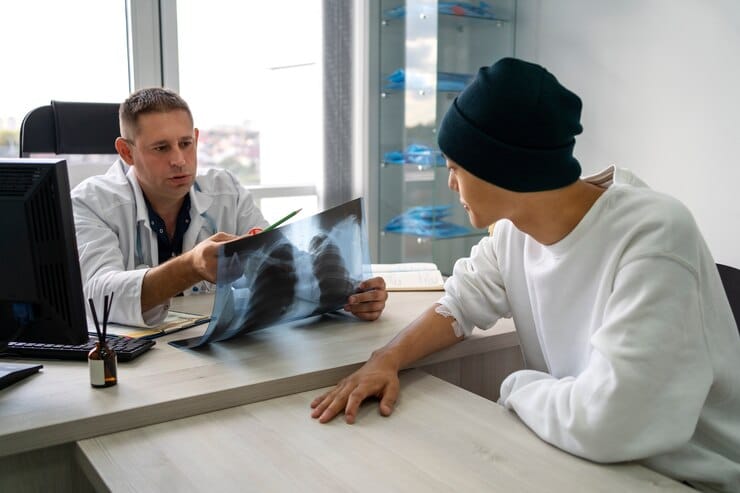What Families Need to Know to Support Their Loved One
A lung cancer diagnosis can be a challenging experience, not only for the patient but also for their families. As a family member, your support can make a significant difference in your loved one’s journey through surgery and recovery. Understanding the complexities of lung cancer surgery, what to expect, and how to provide emotional and practical support is essential. This blog aims to equip families with the knowledge they need to support their loved ones during this critical time.
Understanding Lung Cancer Surgery
Lung cancer surgery is a common treatment option, particularly for patients diagnosed with early-stage lung cancer. The surgery aims to remove cancerous tumors, improve lung function, and enhance the patient’s quality of life. Here are the key types of lung cancer surgeries:
- Lobectomy: Removal of one lobe of the lung.
- Pneumonectomy: Removal of an entire lung.
- Segmentectomy: Removal of a small section of the lung.
- Wedge Resection: Removal of a small, wedge-shaped piece of the lung.
The type of surgery performed will depend on various factors, including the stage of cancer, the tumor’s location, and the overall health of the patient.
Preparing for Lung Cancer Surgery
Preparation for lung cancer surgery involves several steps, and families play a crucial role in ensuring that their loved one is ready for the procedure. Here’s how you can help:
- Attend Appointments: Accompany your loved one to medical appointments and discussions with their healthcare team. This not only provides emotional support but also helps you understand the treatment plan and ask any questions you may have.
- Help with Research: Learn about the type of surgery being performed and what it entails. Understanding the procedure can alleviate anxiety and allow you to explain it to other family members or friends.
- Organize Practical Support: Before surgery, assist your loved one in organizing their home for recovery. This may include preparing meals, arranging for help with household chores, and setting up a comfortable recovery space.
- Discuss Anesthesia and Recovery: Ensure your loved one understands what to expect regarding anesthesia and the initial recovery period. Post-surgery, patients may experience pain, fatigue, and limited mobility, which may require assistance.
What to Expect During the Hospital Stay
The hospital stay after lung cancer surgery can vary in length depending on the complexity of the procedure and the patient’s overall health. Here are some things families should know:
- Monitoring and Care: Patients will be closely monitored in the recovery room and then moved to a hospital room. Family members can provide comfort by being present, helping to keep their loved one calm, and advocating for their needs with the medical staff.
- Pain Management: Effective pain management is crucial for recovery. Understand the pain management plan and encourage your loved one to communicate openly with the medical team about their pain levels.
- Encouraging Mobility: Patients are encouraged to start moving as soon as they are able, as mobility aids recovery. Family members can help by assisting with walks around the hospital or encouraging breathing exercises to promote lung function.
Supporting Recovery at Home
Once your loved one is discharged from the hospital, the recovery process continues at home. Here are some ways to support their healing journey:
- Provide Emotional Support: Recovery can be emotionally taxing. Be there to listen and encourage open conversations about fears and concerns. Offering reassurance and understanding can make a world of difference.
- Help with Daily Activities: As your loved one recovers, they may need assistance with daily tasks such as cooking, cleaning, or running errands. Offer to help with these activities until they regain their strength.
- Encourage Healthy Habits: A balanced diet and hydration are vital during recovery. Help prepare nutritious meals and ensure your loved one is drinking plenty of fluids. Gentle exercise, as approved by their healthcare team, can also aid recovery.
- Monitor for Signs of Complications: Be vigilant about any signs of complications, such as fever, increased pain, or difficulty breathing. If any concerning symptoms arise, don’t hesitate to contact the healthcare provider.
The Importance of Communication
Open communication is key to supporting your loved one effectively. Encourage your family member to share their feelings and needs, and don’t hesitate to express your own feelings as well. Keeping the lines of communication open helps foster a supportive environment where everyone feels heard and understood.
Seeking Expert Guidance
Navigating the journey of lung cancer surgery can be overwhelming, but having the right support and expertise makes all the difference. Mr. Marco Scarci, a leading thoracic surgeon specializing in lung cancer, is dedicated to providing comprehensive care to patients and their families. His expertise in minimally invasive surgical techniques ensures patients receive the best treatment possible.
Contact Mr. Marco Scarci’s office today to learn more about lung cancer surgery, ask questions, and receive guidance tailored to your loved one’s needs. Remember, you are not alone in this journey—support is available to help you and your family navigate the challenges ahead.









